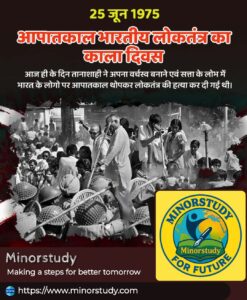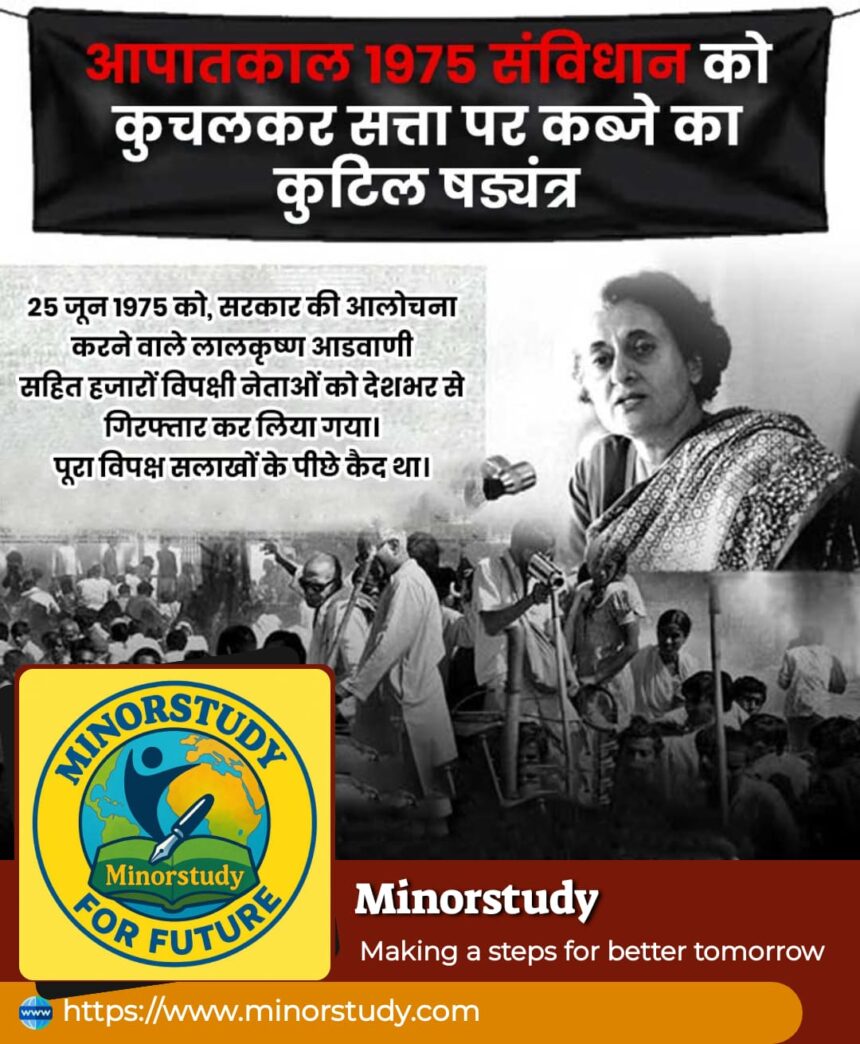7 Alarming Truths About the Emergency in India – The Darkest Chapter of Democracy
Emergency in India: The Indian Emergency (1975–1977) is widely considered the black day in the history of Indian democracy. Declared on 25th June 1975 by then Prime Minister Indira Gandhi, this 21-month period was marked by mass censorship, arrests of political opponents, suspension of civil liberties, and constitutional overreach. It is not just a historical episode; it serves as a warning and lesson for democratic societies everywhere.
- 📜 History of the Emergency in India
- 📅 Emergency in India: Timeline of Major Events
- 📌 Important Facts and Figures: Emergency in India
- 💔 Significance of the Emergency in India– Why It Still Matters
- 🙋 Emergency in India Frequently Asked Questions (FAQs)
- Q1. Why is Emergency called the ‘Black Day’ of Indian democracy?
- Q2. Who opposed the Emergency most vocally?
- Q3. How did the Emergency affect the common citizen?
- Q4. What legal powers allowed the Emergency?
- Q5. What happened in the 1977 elections?
- 🎯 Observance – How India Remembers It
- 💭 Daily Life Impact – Then and Now
- 🎈 Wishing – In a Thoughtful Way
- ✅ Important Points at a Glance: Emergency in India
- 🔚 Conclusion – The Warning Bell That Still Echoes
This article delves into the history, facts, timeline, significance, daily life impact, and the everlasting imprint it left on the Indian conscience. With a human-centric tone, we’ll explore how this era continues to influence India today and why it is crucial to remember, reflect, and remain vigilant.
📜 History of the Emergency in India
On the night of June 25, 1975, President Fakhruddin Ali Ahmed, on the advice of Prime Minister Indira Gandhi, proclaimed a National Emergency under Article 352 of the Constitution. The reason cited was internal disturbances—a vague and controversial claim used to justify the suspension of fundamental rights.
Causes of the Emergency:
Judicial Verdict: On June 12, 1975, the Allahabad High Court found Indira Gandhi guilty of electoral malpractices, invalidating her 1971 election.
Political Unrest: Nationwide protests led by Jayaprakash Narayan, calling for “Sampoorna Kranti” (Total Revolution), challenged Gandhi’s authority.
Threat to Power: With her political legitimacy questioned and opposition growing, the Emergency was a way to retain power by suppressing dissent.
📅 Emergency in India: Timeline of Major Events
| Date | Event |
|---|---|
| June 12, 1975 | Allahabad High Court verdict against Indira Gandhi |
| June 25, 1975 | Emergency declared |
| June 26, 1975 | Press censorship and opposition arrests begin |
| 1976 | 42nd Amendment passed, increasing central power |
| January 18, 1977 | Indira Gandhi announces elections |
| March 21, 1977 | Emergency officially ends |
📌 Important Facts and Figures: Emergency in India
Over 100,000 people were arrested under preventive detention laws.
Fundamental Rights, including freedom of speech and expression, were suspended.
Censorship of newspapers, books, and artistic expressions was rampant.
The RSS, CPI(M), and other opposition parties were banned or restricted.
Sterilization drives were carried out aggressively as part of population control, leading to widespread human rights violations.
The 42nd Constitutional Amendment is often called the “Mini-Constitution” because it dramatically altered the balance of power in favor of the central government.
Doordarshan, the national broadcaster, became a mouthpiece of government propaganda.
💔 Significance of the Emergency in India– Why It Still Matters
Democratic Backsliding: It showed how fragile democracy can be when power becomes absolute.
Vigilance is Key: Citizens learned the importance of defending their rights—a lesson still relevant today.
Judicial and Media Awakening: The passive role of the judiciary and media during Emergency led to demands for stronger institutional independence later.
Strengthening Democracy: Post-Emergency, democratic institutions and civil society became more resilient and vocal.
🙋 Emergency in India Frequently Asked Questions (FAQs)
Q1. Why is Emergency called the ‘Black Day’ of Indian democracy?
Because it represented a complete breakdown of democratic processes—press freedom was crushed, dissenters jailed, and elections postponed.
Q2. Who opposed the Emergency most vocally?
Leaders like Jayaprakash Narayan, Atal Bihari Vajpayee, L.K. Advani, and George Fernandes led the resistance, many of whom were jailed.
Q3. How did the Emergency affect the common citizen?
People lived in fear and silence. Many were arbitrarily arrested, slums were demolished, and forced sterilization became a horrific reality.
Q4. What legal powers allowed the Emergency?
Article 352 of the Indian Constitution, which was later amended to restrict such misuse.
Q5. What happened in the 1977 elections?
The Janata Party won by a landslide, defeating Indira Gandhi, who lost her own seat. It was a democratic resurgence.
🎯 Observance – How India Remembers It
Though there is no official public holiday, many civil society groups, journalists, and political organizations observe June 25 as:
“Democracy Day” to reaffirm commitment to civil liberties.
“Resistance Day” to honor those who fought against authoritarianism.
Seminars, essays, films, and discussions highlight the Emergency’s lessons.
💭 Daily Life Impact – Then and Now
Then:
Silence over protest: Expressing dissent meant jail.
Fear over freedom: Even conversations were whispered.
Loss of livelihoods: Arbitrary demolitions and arrests devastated families.
Mass sterilizations: Especially in North India, traumatized generations.
Now:
Civic Education: Schools and media increasingly discuss the Emergency.
Legal reforms: Emergency-related powers now need stricter checks.
Active citizenry: People are more aware of their constitutional rights.
🎈 Wishing – In a Thoughtful Way
Let’s wish on this day not with celebration, but with conscious reflection:
🕯️ “May our democracy never again see a night so dark. Let us remember the past to protect our future.”
– Minorstudy Foundation

✅ Important Points at a Glance: Emergency in India
Declared: 25 June 1975
Ended: 21 March 1977
Duration: 21 months
Declared by: Indira Gandhi
Key Opposers: JP Narayan, George Fernandes, Atal Bihari Vajpayee
Key Features: Censorship, arrests, forced sterilizations
Lesson: Never take democracy for granted
🔚 Conclusion – The Warning Bell That Still Echoes
The Emergency wasn’t just a chapter in textbooks—it was a national trauma that affected generations. It reminds us that liberty is not inherited—it is earned, preserved, and defended every day.
For India, a land built on the values of freedom and pluralism, this period serves as a grim reminder of what happens when power goes unchecked. Remembering June 25 each year isn’t just about looking back; it’s about guarding our future.
🧠 Democracy dies in silence. Let our voices be its eternal guardians.








